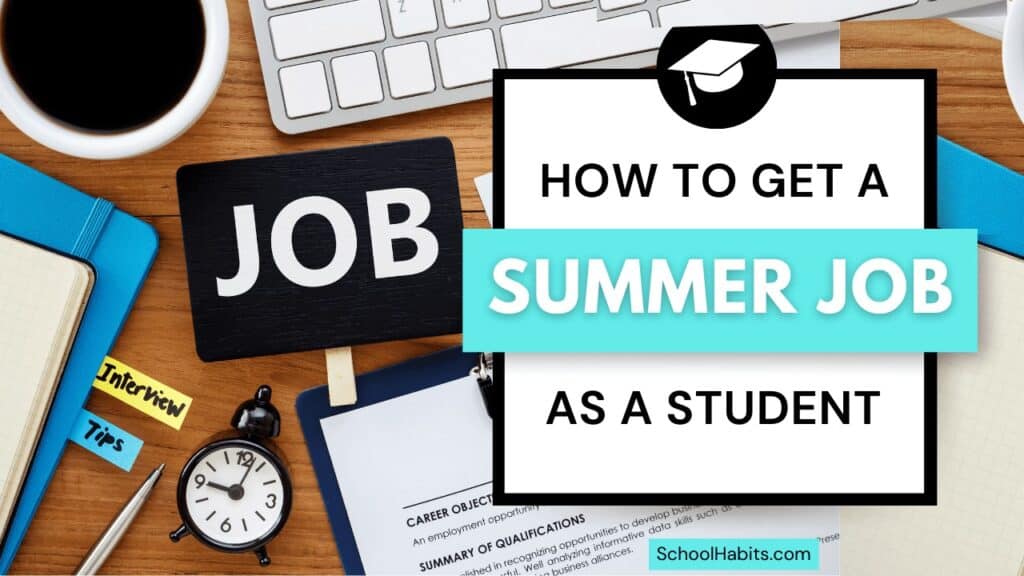
By Katie Azevedo, M.Ed.
This blog post is about how to get a summer job as a student. It contains tips for choosing the right summer job, where to find summer jobs, and strategies for applying for a summer job.
Getting a summer job as a high school or college student can be a great way to earn money, build valuable skills that will serve you in other areas, and enhance your student resume with marketable experience. Whether you’re applying for your first summer job or your seventh, the guidelines below can make the job-hunting process a little smoother.
How to get a summer job
The steps for getting a summer job can be simple, as long as you act quickly and communicate effectively. Below are the basic steps to getting a summer job. Then, throughout the rest of this post, I explain each step in detail.
- Determine what type of summer job you want to have
- Apply to the job, making sure you have the right materials
- Follow up on all job applications and interviews
The above three steps might seem overly simplified, but at the end of the day, that’s really what it takes to apply for summer jobs. Sure, there will be nuances, snags, and unexpected situations that arise, but I explain how to deal with those in the following sections.
How to choose the right summer job
If you’re a high school or college student, you could choose a summer job based on various factors, depending on your unique situation, resources, and future goals. (If you’ve already graduated from college and are looking for a year-round job, this tutorial isn’t for you.)
Below are some factors to consider when choosing which jobs to apply to:
- What skills you have that you want to develop further or what skills you want to acquire. Speaking of skills, these are the 4 most important skills you need in college – I hope you have them.
- The distance to the job and whether or not you have access to transportation: Can you get a ride there? Can you walk or take a bike? If not, can you carpool with someone? If you can’t get to the job in a dependable way, it won’t work.
- The compensation (money): How much do you want or need to make? Do you have financial goals, such as saving $3000 by the end of the summer? Can you negotiate on the salary?
- The hours required or available: Do they want you to work more than you can? Or do you want to work more hours than they can offer?
- The job’s flexibility: Will they let you take a week off for a family vacation or for field hockey camp?
- Whether the job is in an industry you’re interested in: If you’re in college, it might be a good idea to look for jobs in industries relevant to your future goals. If you’re in high school, focus more on the skills you’ll be learning. (Yes! Working at a pizza or ice cream place is an excellent summer job because public-facing jobs lead to valuable skill development!)
Where to find summer job opportunities
You can find summer job opportunities all over the place if you’re creative and persistent. Below are some ideas to get you started in your job search:
- Online job boards: Websites like Indeed, LinkedIn, Glassdoor, and CareerBuilder often have dedicated sections for summer jobs or internships. Students can search for positions based on location, industry, or specific keywords.
- Company websites: Many companies post their job openings directly on their websites. Students can visit the career or jobs section of companies they are interested in and look for summer job opportunities.
- College or university career services: Most colleges have career service centers that provide job listings and resources for students. These offices often have partnerships with local businesses and organizations that offer summer job opportunities.
- Job fairs and career events: Attend job fairs or career events hosted by colleges, universities, or local organizations. These events allow students to meet employers face-to-face, learn about available positions, and submit their resumes directly.
- Networking: Tap into personal and professional networks to discover potential summer job opportunities. Talk to professors, classmates, family, friends, and alumni who may have connections or knowledge of available positions. Inform friends, family, and acquaintances that you are seeking a summer job. Sometimes, informal opportunities may arise through personal connections or word-of-mouth referrals.
- Local businesses and organizations: Check with local businesses, nonprofit organizations, community centers, summer camps, recreational facilities, and retail establishments in your area. These businesses often hire seasonal employees, including students, for the summer months.
- Online platforms and gig economy: Explore online platforms such as TaskRabbit, Uber, Lyft, or food delivery services like DoorDash or Grubhub. Though many of these types of jobs have age requirements, these gig-based or flexible work opportunities can be suitable for older students during the summer.
- Government programs and internships: Look for government-sponsored programs, internships, or work-study opportunities specifically designed for students. These can be found on government websites, local municipality portals, or through college career services.
When to apply for a summer job
You should begin looking and applying for summer jobs in the spring. The process of researching jobs, filling out applications, waiting for responses, and scheduling interviews can sometimes take weeks or even a few months. Hiring managers are accustomed to hiring students for temporary employment over the summer, and they know that if you apply for the job in April, you may not be able to begin work until school gets out in June. As long as you communicate clearly during the hiring process, you’ll be fine. If you must start your job before school gets out, use these tips for balancing school and a part-time job.
How to apply for a summer job
Always follow the specific instructions for each job you’re applying to. If they want you to apply online, do that. If they want you to apply in person, do that.
How do you know whether to apply online or in person? Three ways: check the company website, call the company, or visit the company in person and ask to speak to a hiring manager.
Some students bypass the standard job application process altogether, relying instead on connecting with people in their or their parents’ personal or professional network. Reaching out to people you know is a great way to find a summer job, and you should tactfully and politely use any connections available to you.
Student resume: In addition to following all application instructions, I advise that you have a student resume prepared ahead of time. Even if a hiring manager doesn’t require a resume, you can sometimes submit one as an option, which I highly recommend you do.
References: Nearly all job applications will ask you for references. This means you need to provide the names and phone numbers of people who can confirm your qualifications and character. (The hiring manager will call them.) If you’re submitting a student resume, your references should be listed there. If you’re not submitting a resume, provide the name and contact information of someone who knows you well, but is not a family member (a former employer, a coach, a teacher, someone you babysit for, etc.).
Online presence: Your hiring manager will most definitely research your online presence. This means that your online presence should be clean and professional, and should not portray negativity, hate, inappropriate activity, or pictures that don’t reveal your best attributes. Clean up your social media presence and consider making a LinkedIn profile if you haven’t done so yet.
How to handle follow-up communication
Hitting submit on an online job application is certainly not the last step of the application process. No matter how you apply for your summer job, you should be prepared to follow up with the hiring manager or company.
If you have applied in person or if you’ve been interviewed, the first follow-up contact should be a thank you email or letter within 24-48 hours of the interview. Always extend prompt written gratitude for in-person applications and interviews.
Aside from thank you notes, the appropriate time to follow up after applying for a summer job can vary depending on the specific circumstances and the employer’s stated timeline. However, as a general guideline, I suggest waiting about one to two weeks before following up on your application.
Note: Always review the application guidelines or any correspondence you received from the employer for any specific instructions on when or how to follow up. Adjust your approach accordingly to ensure you adhere to their guidelines and demonstrate your attention to detail.
When following up, you can consider reaching out via email or phone. In your message, express your continued interest in the position, briefly remind the employer of your application, and politely inquire about the status of the hiring process. This follow-up communication should be concise, polite, and professional.

